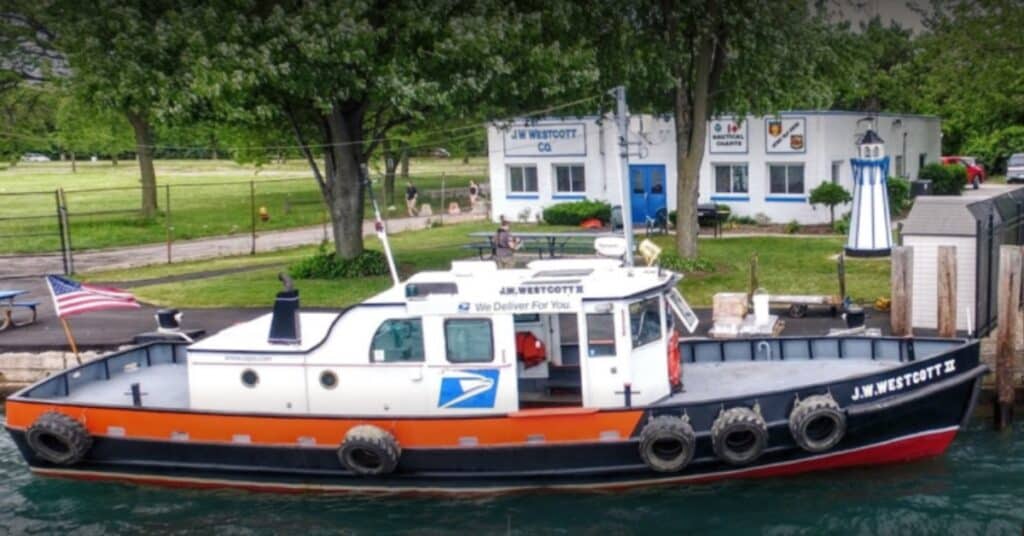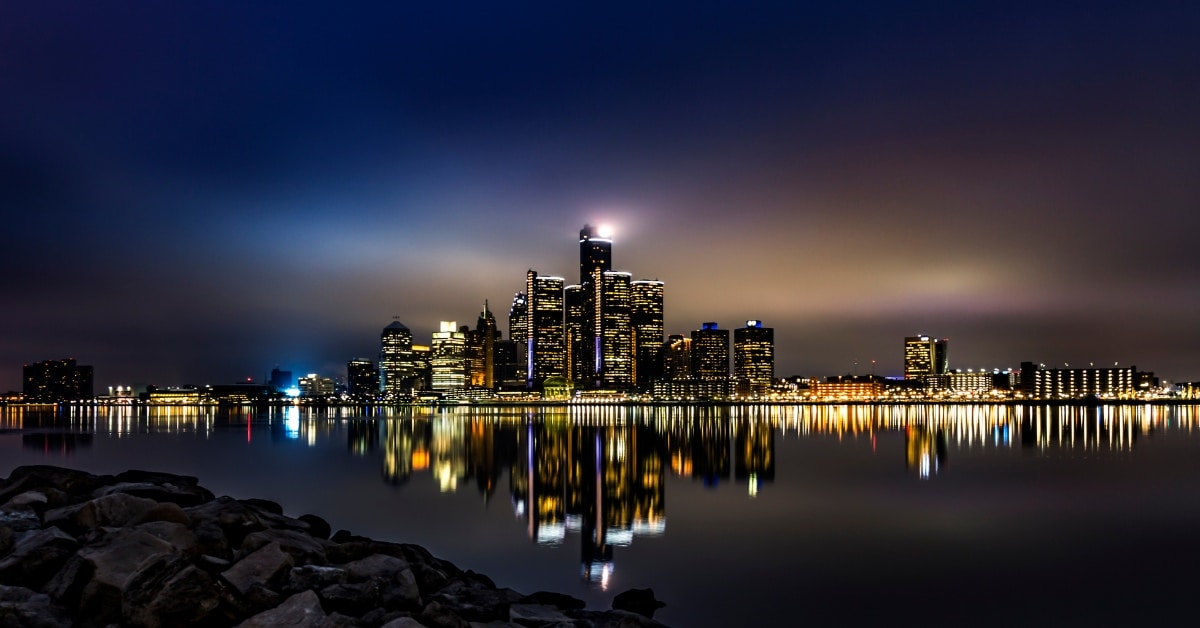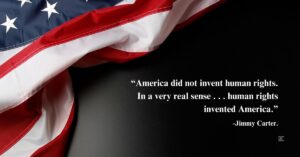Over the recent decades, Detroit has taken on many nicknames, including Motown, The Motor City, Hockeytown, Rock City, or just simply The D. While we are proud of our automotive heritage and music history, there are lesser-known facts about Detroit. Here we will explore ten facts every Detroiter, historian, or pop-culture enthusiast should know.
1. First City to Pave a Concrete Road
In 1909, Wayne County built the first mile of concrete highway in the world on Woodward Avenue between Six and Seven Mile roads. Until then, a surfaced road was gravel, and often a horse was employed to pull a car out of the muddy muck. Road builders from near and afar came to see how concrete stood up under the heavy traffic of that period. It cost $13,537, including $1,000 in state aid.
The success of this experiment led to other transportation firsts. In 1919 the nation’s first 4-way three-color traffic light was installed on the corner of Woodward and Michigan Avenues in Detroit 1. In 1930 the Detroit-Windsor Tunnel was completed making it the first traffic tunnel between two nations. By 1942, the world’s first urban freeway opened to the public, the Davison Freeway.
2. Home to the Ice Cream Soda
Long before A&W introduced their root-beer float, the ice cream soda was being served to thirsty Detroiters along Boston Boulevard. Many historians claim Detroit’s own Fred Sanders, a confectioner, and owner of The Pavilion of Sweets, first served the drink to two customers in 1876. A popular drink at the time was the sweet cream soda. One day when the ice delivery truck failed to show, Sander’s day-old cream went sour. Improvising, he instead mixed ice cream with the carbonated beverage, and hence the drink was born.
Also Read
By the 1880s, the most popular combination for this drink was Ginger Ale with ice cream, aka the Boston Cooler, specifically Vernor’s Ginger Ale & Sander’s ice cream. The beverage was named after the Boulevard and not the Massachusetts city. James Vernor’s drugstore, located a short distance away, made the unique combination seem very natural. Vernor’s produced an intense golden ginger ale, unlike most modern dry ginger ales. Until the 1920s, ginger ale was the nation’s most popular choice of carbonated beverage, and Vernor’s happens to be our nation’s oldest soda. Soda connoisseurs still advocate this day that if you want to taste ginger ale the way it was meant to taste, locate a Vernor’s.
3. Supplied 75% of liquor during Prohibition
In January 1920, the era of Prohibition began in the U.S. The Detroit River, barely one mile across in some places, was a smuggler’s dream. Enterprising smugglers carried cargo beneath boats, rigged mechanical cables across the river, and utilized old underground tunnels to transport their illegal bounty. During cold winter months, the river became a highway as daring smugglers in automobiles made their way across the ice from Canada to the United States.
A number of government agencies, including the U.S. Customs Department, the U.S. Coast Guard, the Michigan State Police, and the Detroit Police Department, combined forces to patrol the waterways in an effort to stop the smuggling. Despite their efforts, it’s estimated that more than 75% of illegal liquor supplied to the U.S. during Prohibition entered the country by way of the Detroit River, Lake St. Clair, and the St. Clair River.
4. First Ever News Radio Broadcast
Going on air on August 20, 1920, 8MK, later renamed WWJ, is believed to be the first station to broadcast regular news reports. Financed by The Detroit News, 8MK was initially licensed to Michael DeLisle Lyons. He assembled the station in the Detroit News Building. As was common practice in the early days of radio, the Scripps family asked Lyons to register the station in his name in case this rather new technology was only a fad.
Newspaper owners at the time were worried radio might replace newspapers and put them out of business. Almost 100 years later and we’re happy to report both The Detroit News and WWJ Radio still operate today.
5. Only Floating Post Office in the U.S.

The J. W. Westcott II docks just South of The Ambassador Bridge along the western shore of the Detroit River. She is America’s only floating ZIP Code [48222]. Delivering over 100 years of “mail-by-the-pail,” the J.W. Westcott Company was originally formed in 1874 by Captain J.W. Westcott to inform passing vessels of changes in orders.
Today the 45-foot vessel’s duties include U.S. mail delivery, freight delivery, storage, and forwarding; message service; passenger service to and from vessels and pilot boat services for the Port of Detroit. The Westcott also sells nautical charts, postcards, and books and has been known to deliver the occasional mid-river pizza.
6. Largest Island Park Within a City
At 987 acres, Belle Isle Park is the largest island park in the United States. First opened to the public in 1884, it is Detroit’s first major city park. Designed by Frederick Law Olmstead, the same designer credited with New York City’s Central Park. The park features a 9-hole golf course, museum, picnic shelters, tennis courts, basketball courts, baseball fields, and a 150-acre state-protected wooded area. It is also home to a wide variety of small animals, birds, and European fallow deer. Belle Isle is rich in history, which you can further read about here.
7. Only City From Which One Can Look South to Canada
Though not the most Northern major U.S. City2, Detroit is the only city in the 48 contiguous States where one can gaze south toward Canada. Specifically, the Windsor, Ontario skyline as pictured above. For you, trivia buffs, the northernmost city in the contiguous United States is Seattle, Washington.
8. Great Salt Mines Lie Beneath
Detroit is built over an enormous salt bed. 1,200 feet below the city surface, salt mines spread over 1,400 acres and have more than 50 miles of roads.
Glaciologists believe the salt was created when a huge sea covering the region evaporated more than 400 million years ago, forming salt deposits that were gradually buried by glacial activity.
This salt bedspreads over 170,000 square miles under Michigan, Ontario, Ohio, Pennsylvania, New York, and West Virginia. Some estimates suggest that there is enough salt in the Metro Detroit underground to last 70 million years.
9. Birthplace of Techno
Most people associate Detroit music with the Motown sound. Celebrating its 50th anniversary this year, it has earned a well-deserved place in music history. Another sound, however, that is a true Detroit original is Techno.
Originating in the 1980s, largely as an underground movement, the increasingly popular new music proved electronics could be used to express both funk and soul. Juan Atkins, Derrick May, and Kevin Saunderson, a Detroit trio who were high school friends, are considered the Godfathers of Techno.
In the late 80s and early 90s, Techno which had failed to gain mainstream success in the U.S., became a huge phenomenon in Europe – especially in Great Britain. This influenced artists like The Prodigy, who achieved success, and number-one singles on the pop charts.
The Detroit techno scene is well-documented in the movie High Tech Soul. Starting in 2000, every Memorial Day Weekend, Detroit hosts an electronic music festival where DJs and partiers unite from all corners of the world to celebrate the beats.
10. Sports Capital of the Midwest
Behind the Art Deco architecture, the “Big 3”, and the oft-too-public political scandals, Detroit is truly the sports capital of the Midwest. In major sports, Detroit ranks third behind New York and Boston in championships, 22 in total 3. That’s quite the feat considering Detroit hasn’t had a competitive football team since the Eisenhower administration.
Sold-out games at Ford Field are a testament to the passion of the Detroit fan. The Pistons, Wings, and Tigers are a better bet if you want to walk away happy. Detroit has also been a great host to a multitude of national sporting events. Comerica Field hosted the MLB All-Star game, and 2006 brought Detroiter to the World Series. Earlier that same year, Pittsburgh and Seattle battled it out in Super Bowl XL, and more recently, Detroit hosted the NCAA Final Four. Stanley Cup Playoff appearances are almost commonplace during spring, as well as unique international events such as the Red Bull Air Race.
Rivalries are welcomed, so next time your favorite team is playing in Detroit, stop by to watch them live unless you’re a Penguin. Just kidding.
Detroit is a city with a rich history and a vibrant culture. Located in the state of Michigan in the United States, Detroit has played a significant role in the country’s automotive industry and has been a major contributor to the country’s music scene. Despite facing challenges in recent decades, Detroit is a city on the rise, with a growing population and a renewed sense of energy and optimism.






